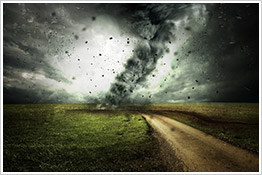Addressing Fires, Hurricanes, and Anger
By Marjorie F. Eddington
Categories: Safety Issue:
There has been a lot of concern about the fires and hurricanes. There have also been questions about anger. We are going to address these together.
Response (staff answer):
 Hurricanes, tsunamis, fires are frightening. We often feel helpless as we watch the furious devastation. Such an out-of-control state of nature can be likened to an out-of-control state of mind. The force of the hurricane, the flames of the fire, the tossing of the waves are analogous to anger and rage, which are equally destructive when let loose. How do we handle these mental and physical states? We meet them head on. We turn to God and quiet the storms. Hurricanes, tsunamis, fires are frightening. We often feel helpless as we watch the furious devastation. Such an out-of-control state of nature can be likened to an out-of-control state of mind. The force of the hurricane, the flames of the fire, the tossing of the waves are analogous to anger and rage, which are equally destructive when let loose. How do we handle these mental and physical states? We meet them head on. We turn to God and quiet the storms.
Nowhere is this more clear than in Jesus’ experience as told by Mark. At evening, Jesus and his disciples got into a ship to go across the sea (or lake). Jesus fell asleep. A huge storm arose, the waves crashed into the boat, and the ship was about to sink. The terrified disciples woke up Jesus. “He got up, rebuked the wind and said to the waves, ‘Quiet! Be still!’ Then the wind died down and it was completely calm” (Mark 4:39 NIV).
Then, as soon as they get to the other side to the town of the Geresenes (the Gadarenes), they are confronted by a crazy man “with an impure spirit” who lived in the tombs, cut himself with rocks, and was totally uncontrollable, so much so that he broke the chains people used to try to bind him. Just as Jesus rebuked the wind, so he rebuked the evil spirit. And when he did so, the man howled, “shouted at the top of his voice, ‘What do you want with me, Jesus, Son of the Most High God? In God’s name don’t torture me!’” (5:7).
Jesus asked his name, which was Legion, signifying that he was plagued by many demons, many problems. So at the request of the demons, Jesus sent the unclean spirits into the herd of swine which ran into the sea and drown. The man was healed, “dressed and in his right mind” (5:15).
First, Jesus calmed the storm that would overturn the boat; then, he calmed the mental storm that ravaged the man. It was the same type of force that Jesus stilled—an angry, seemingly uncontrollable force that would destroy. Yet, he stilled both. And we can do the same. We can say, “Be quiet!” “Silence!” “Peace, be still!” to storms that would take away our calm.
What are we quieting when we quiet such storms? Anger, rage, ire, heat, flames, wind. Such emotions and their outward manifestations are really symptoms, though, of a deeper issue. And that issue is usually fear. We’re afraid of what might happen, and we’re not sure how to deal with it. Often we feel helpless as a result, and out of control. We feel trapped by our fear and don’t know what to do. We allow fear to paralyze or to infuriate and enflame us. We give fear power to control us.
We’re out of balance, as is the weather. Hot and cold air meet, negative and positive electrons are out of balance, and wind increases, lighting strikes, thunder claps, and the rain pours down and the rivers flood or the fires erupt. If we act when we’re angry, the outcome is just as destructive, as we see in the story of the man of Geresa.
We counteract the destructive element of fear, and its various manifestations, with faith. Jesus expected his disciples to have faith: “Why are you so afraid? Do you still have no faith?” Jesus queried after he stilled the storm (4:40). Now the word faith in the Bible is actually more akin to the word trust and deep understanding. Jesus wanted them to have a deep understanding of God, a steadfast trust in God’s ability to care for His beloved children in every way—mentally and physically.
That faith, that deep trust in God that Jesus had, enabled him to look at the raging storms and calm them. He knew God’s power is supreme. He knew God’s love is infinite. Jesus did not fear a possible negative future outcome. So there was nothing to get angry about. Anger didn’t have the opportunity to build up in him and cause him to lose control. He knew God is always in control, and that gave him the power to look the storms in the face and see them as powerless.
The storms were powerless to sink the boat and drown his very precious disciples. And even though the storms had eradicated the man’s rightful mental capacities and turned him insane, Jesus instantly calmed the man and restored him to full health. He deprived fear and anger of power.
Fear, anger, is powerless unless we give them power. We certainly don’t want to empower fear or anger. We don’t want to fan the flames. Rather, we want to still such emotions, to calm our thoughts, to settle ourselves in peace. So we turn to our ever-present Parent who loves us dearly, and we trust in God’s ability to calm the storms. It’s not our own power that brings peace, it’s God’s. |